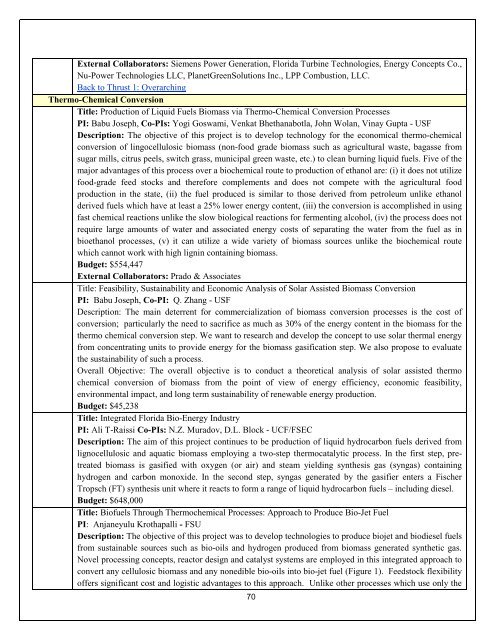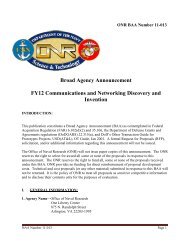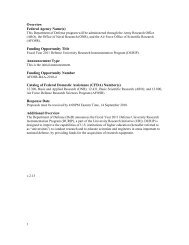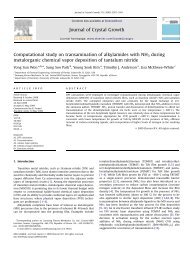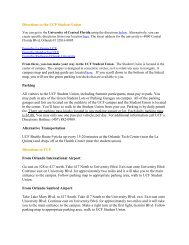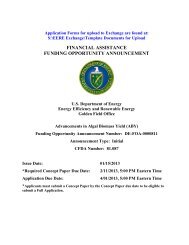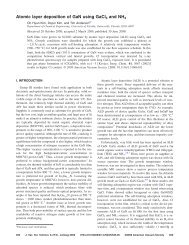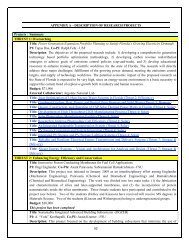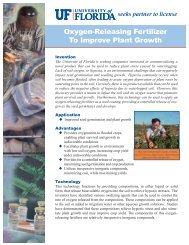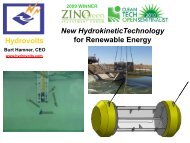Annual Report- Part III - Florida Energy Systems Consortium
Annual Report- Part III - Florida Energy Systems Consortium
Annual Report- Part III - Florida Energy Systems Consortium
You also want an ePaper? Increase the reach of your titles
YUMPU automatically turns print PDFs into web optimized ePapers that Google loves.
External Collaborators: Siemens Power Generation, <strong>Florida</strong> Turbine Technologies, <strong>Energy</strong> Concepts Co.,Nu-Power Technologies LLC, PlanetGreenSolutions Inc., LPP Combustion, LLC.Back to Thrust 1: OverarchingThermo-Chemical ConversionTitle: Production of Liquid Fuels Biomass via Thermo-Chemical Conversion ProcessesPI: Babu Joseph, Co-PIs: Yogi Goswami, Venkat Bhethanabotla, John Wolan, Vinay Gupta - USFDescription: The objective of this project is to develop technology for the economical thermo-chemicalconversion of lingocellulosic biomass (non-food grade biomass such as agricultural waste, bagasse fromsugar mills, citrus peels, switch grass, municipal green waste, etc.) to clean burning liquid fuels. Five of themajor advantages of this process over a biochemical route to production of ethanol are: (i) it does not utilizefood-grade feed stocks and therefore complements and does not compete with the agricultural foodproduction in the state, (ii) the fuel produced is similar to those derived from petroleum unlike ethanolderived fuels which have at least a 25% lower energy content, (iii) the conversion is accomplished in usingfast chemical reactions unlike the slow biological reactions for fermenting alcohol, (iv) the process does notrequire large amounts of water and associated energy costs of separating the water from the fuel as inbioethanol processes, (v) it can utilize a wide variety of biomass sources unlike the biochemical routewhich cannot work with high lignin containing biomass.Budget: $554,447External Collaborators: Prado & AssociatesTitle: Feasibility, Sustainability and Economic Analysis of Solar Assisted Biomass ConversionPI: Babu Joseph, Co-PI: Q. Zhang - USFDescription: The main deterrent for commercialization of biomass conversion processes is the cost ofconversion; particularly the need to sacrifice as much as 30% of the energy content in the biomass for thethermo chemical conversion step. We want to research and develop the concept to use solar thermal energyfrom concentrating units to provide energy for the biomass gasification step. We also propose to evaluatethe sustainability of such a process.Overall Objective: The overall objective is to conduct a theoretical analysis of solar assisted thermochemical conversion of biomass from the point of view of energy efficiency, economic feasibility,environmental impact, and long term sustainability of renewable energy production.Budget: $45,238Title: Integrated <strong>Florida</strong> Bio-<strong>Energy</strong> IndustryPI: Ali T-Raissi Co-PIs: N.Z. Muradov, D.L. Block - UCF/FSECDescription: The aim of this project continues to be production of liquid hydrocarbon fuels derived fromlignocellulosic and aquatic biomass employing a two-step thermocatalytic process. In the first step, pretreatedbiomass is gasified with oxygen (or air) and steam yielding synthesis gas (syngas) containinghydrogen and carbon monoxide. In the second step, syngas generated by the gasifier enters a FischerTropsch (FT) synthesis unit where it reacts to form a range of liquid hydrocarbon fuels – including diesel.Budget: $648,000Title: Biofuels Through Thermochemical Processes: Approach to Produce Bio-Jet FuelPI: Anjaneyulu Krothapalli - FSUDescription: The objective of this project was to develop technologies to produce biojet and biodiesel fuelsfrom sustainable sources such as bio-oils and hydrogen produced from biomass generated synthetic gas.Novel processing concepts, reactor design and catalyst systems are employed in this integrated approach toconvert any cellulosic biomass and any nonedible bio-oils into bio-jet fuel (Figure 1). Feedstock flexibilityoffers significant cost and logistic advantages to this approach. Unlike other processes which use only the70


